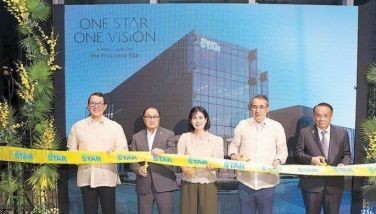Fil-Ams in US call for immigration reforms
April 11, 2007 | 12:00am
WASHINGTON – Filipino-American community leaders are at the forefront of a campaign by Asian advocacy groups to press for humane immigration reform in the United States in the face of proposals from the Bush administration that seek to limit visas for parents, children and siblings of US citizens.
No two issues inflame the passions of Filipino-Americans more than family-based immigration preferences and full equity for Filipino World War 2 veterans so it came as no surprise when key leaders like Alma Kern and Gloria Caoile began to mobilize community opposition to any move that could jeopardize those twin goals.
US President George W. Bush on Monday re-launched his push for immigration reforms to deal with some 12 million illegal immigrants in the country, including about 250,000 Filipinos. But the Democratic-controlled Congress and the Republicans are at odds over how to uphold the law without disrupting lives or drastically reducing the migrant workforce needed to keep US agriculture and industry running efficiently.
Under a new White House plan on immigration reforms leaked out recently, actively employed illegal aliens can apply for "Z" visas valid for three years and renewable indefinitely at a cost of $3,500 each time.
To become legal permanent residents with a green card, they will have to return to their home country and apply to re-enter the US legally and pay a $10,000 fine.
"These provisions are so draconian they would essentially make indentured workers out of the 12 million (illegal immigrants)," said Linda Chavez, a prominent Hispanic-American conservative commentator and radio talk show host.
Another controversial suggestion is to make more green cards available to skilled workers by eliminating family preferences.
Kern, head of the National Federation of Filipino-American Associations (NaFFAA), said the proposal to deny legal immigrants the right to sponsor their relatives to join them was alarming, adding it undermined the Bush administration’s core belief about family values.
The proposals – referred to by administration officials as "talking points" – also call for the elimination of preferential classes for the allotment of immigrant visas, in particular the fourth preference (brothers and sisters of US citizens), the third preference (adult married children of US citizens), and the first preference (adult unmarried children of US citizens), and place caps and waiting periods on parents of US citizens.
As it is, Filipinos who have become naturalized US citizens must wait the longest under the quota system before they can petition their siblings to join them – in some cases as long as 23 years.
The Filipino-American community is also pressing legislators to pass measures to repeal a 60-year-old law and award full veterans’ benefits to Filipinos who fought with US forces in World War 2 and to make it easier for children of these veterans to immigrate to the US.
The NaFFAA is among more than a dozen national convenors that are organizing the Asian Pacific American community to meet in Washington on April 30 and May 1 to hold dialogues, visit legislators and stage a mass rally at the Capitol.
No two issues inflame the passions of Filipino-Americans more than family-based immigration preferences and full equity for Filipino World War 2 veterans so it came as no surprise when key leaders like Alma Kern and Gloria Caoile began to mobilize community opposition to any move that could jeopardize those twin goals.
US President George W. Bush on Monday re-launched his push for immigration reforms to deal with some 12 million illegal immigrants in the country, including about 250,000 Filipinos. But the Democratic-controlled Congress and the Republicans are at odds over how to uphold the law without disrupting lives or drastically reducing the migrant workforce needed to keep US agriculture and industry running efficiently.
Under a new White House plan on immigration reforms leaked out recently, actively employed illegal aliens can apply for "Z" visas valid for three years and renewable indefinitely at a cost of $3,500 each time.
To become legal permanent residents with a green card, they will have to return to their home country and apply to re-enter the US legally and pay a $10,000 fine.
"These provisions are so draconian they would essentially make indentured workers out of the 12 million (illegal immigrants)," said Linda Chavez, a prominent Hispanic-American conservative commentator and radio talk show host.
Another controversial suggestion is to make more green cards available to skilled workers by eliminating family preferences.
Kern, head of the National Federation of Filipino-American Associations (NaFFAA), said the proposal to deny legal immigrants the right to sponsor their relatives to join them was alarming, adding it undermined the Bush administration’s core belief about family values.
The proposals – referred to by administration officials as "talking points" – also call for the elimination of preferential classes for the allotment of immigrant visas, in particular the fourth preference (brothers and sisters of US citizens), the third preference (adult married children of US citizens), and the first preference (adult unmarried children of US citizens), and place caps and waiting periods on parents of US citizens.
As it is, Filipinos who have become naturalized US citizens must wait the longest under the quota system before they can petition their siblings to join them – in some cases as long as 23 years.
The Filipino-American community is also pressing legislators to pass measures to repeal a 60-year-old law and award full veterans’ benefits to Filipinos who fought with US forces in World War 2 and to make it easier for children of these veterans to immigrate to the US.
The NaFFAA is among more than a dozen national convenors that are organizing the Asian Pacific American community to meet in Washington on April 30 and May 1 to hold dialogues, visit legislators and stage a mass rally at the Capitol.
BrandSpace Articles
<
>
- Latest
- Trending
Trending
Latest
Trending
Latest
Recommended
































